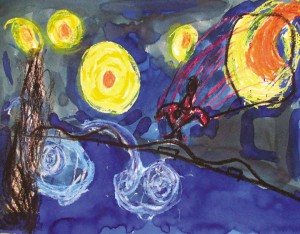By Annabelle Short
Music and the arts can be important avenues to help those on the autism spectrum. This article is going to focus on the use of music to help those on the autism spectrum.
Why Music?
What does research show about music and autism?
One 2004 study looked at the effects that music had on children and teens with autism. It found that using music in the lives of autistic children and teens helped in the following ways:
● Increased focus and attention
● Increased communication and communication attempts
● Reduction of anxiety
● Improved coordination
● Generally improved social behaviors
What the original study didn’t consider, though, was the effect of music on autistic adults. Subsequent studies have been conducted in the time since and it has been found that music can also help autistic adults. At the very least, official studies and therapists alike have found music to be an important therapeutic tool as music is a good way to get an autistic person’s attention when they are struggling to focus.
Improved Communication
In a statistic released by Autism Speaks, it was revealed that as many as 25% of those individuals diagnosed with autism are nonverbal. However, there is also a large group of autistic individuals who aren’t technically nonverbal but they still struggle with communication. Music can provide help with those individuals.
In 2011, a study was published that aimed to use a new concept known as Auditory-Motor Mapping Training (AMMT) to help autistic children communicate and understand verbal commands. The process of these sessions included the use of drums as well as a therapist singing certain words and phrases to help the child learn. In the end, the study showed distinct improvement in the communication skills of the children.
Another hypothesis is that music can teach individuals with autism new words and social constructs. While this idea is less studied than concepts like AMMT, the idea behind it is that if an autistic individual listens to music a lot, they’ll start to pick up on words and messages within the lyrics.
Behavioral Benefits
In 2013, a study was conducted to look at the effects of music on the behavior of autistic children. With the use of weekly music therapy with 41 autistic children, researchers saw an improvement in behaviors – especially inattentive behaviors.
During the study, the children were exposed to a once a week, hour-long music therapy session. Over the ten-month period of the study, the children’s behaviors were monitored with a checklist of negative behaviors such as restlessness, noisiness, and aggression. While the improvements were not immediately seen, this study did note improvements in these behaviors in over half of the children after the study had been going on for a few months.
Reduction of Anxiety
For the average child, loud or rowdy environments can be just a part of everyday life. For autistic children, though, a loud environment can be overstimulating. Because many individuals on the autism spectrum are unable to filter the stimuli they encounter, it’s easy for an autistic individual to become overwhelmed. With this in mind, it is easy to see why those on the spectrum can have anxiety issues.
Some studies have shown, though, that music can lessen anxiety in autistic individuals which, in turn, reduces those behaviors that are attributed to anxiety.
Just like anyone else, autistic individuals may find they have preferences for one genre of music over another. Generally, though, classical music or any kind of music that has a repetitive beat is best to reduce anxiety.
A Chance to Have Fun and Bond
One thing that makes music therapy popular compared to some other therapies is that it is enjoyable. For an individual who is more prone to sensory experiences, it can be not only relaxing but fun to play or even listen to music.
In addition, music is something that is easy to bond over as well. By employing the use of music, the door is opened for one of many ways that parents and their autistic children can play together and have fun while they are doing it!
***
Annabelle Short is a writer and she works with several organizations to provide families with the best resources for raising and educating a special needs child. When not working, she’s spending time with her family or putting pen to paper for her own personal pursuits. Annabelle is a mother and she loves sewing and making crafts with her two children.
For more studies on music and therapy, visit the Art of Autism Research Hub. To find a music therapist visit the American Music Therapy Association.







